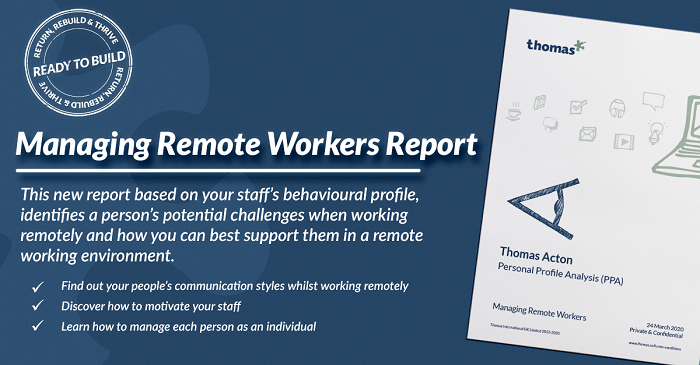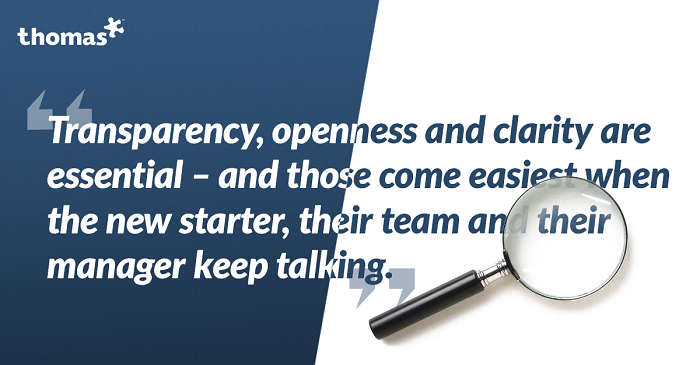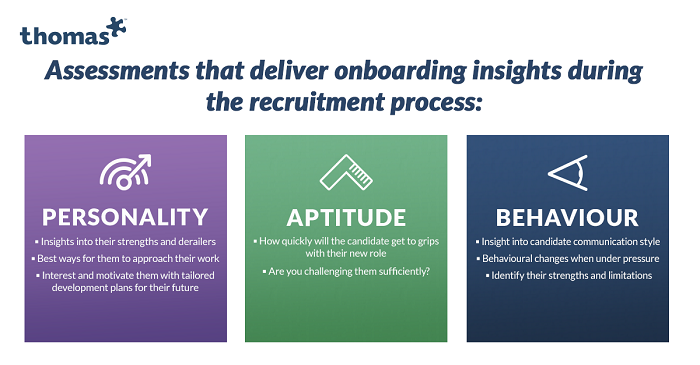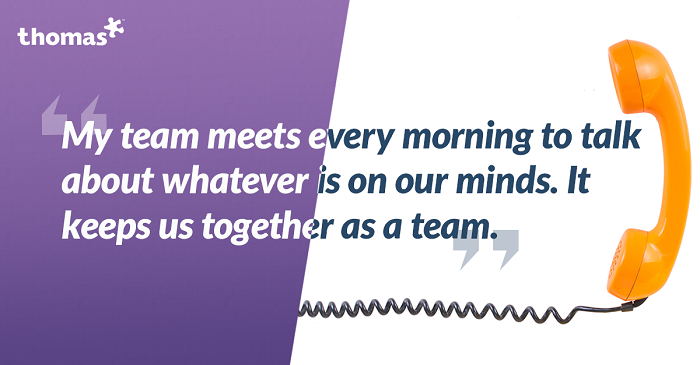Right now, everyone is talking about how the world of work is changing, or will change, due to Covid-19. We’ve already outlined the challenges you’ll face during this journey, a 10-step plan to manage teams as they adjust to the new normal and discussed the new world of recruitment. One area which hasn’t received as much attention, however, is what Covid-19 and the new normal mean for how you onboard new recruits to your organisation.
A crucial time for new employees
Research has shown that the average cost of a new hire is $4,129. But poor onboarding can leave new recruits feeling unhappy, which can make them unproductive and may result in them leaving – wasting all the time and resource you spent finding, interviewing and hiring them in the first place. Perfecting your onboarding process means that investment is much more likely to pay dividends, which is especially important with most organisations watching the bottom line carefully during lockdown.
The challenges remote onboarding brings need to be solved if your organisation is to be truly resilient in the future. If you can’t successfully bring new talent into the organisation, it’ll affect performance in every department – not to mention your talent pipeline and succession planning efforts.
At Thomas International, we’ve had the pleasure of onboarding a few new employees during lockdown. We sat down with them and our hiring managers to uncover what works well – and what should be avoided – when onboarding people remotely.
7 tips for onboarding new hires remotely
1. Remember that the relationship starts before day one
It’s worth remembering that your new starter will have been forming an opinion of your organisation from the very first time they spoke to you. “The relationship between employee and employer starts to build during the recruitment process, and grows between offer and start,” observes Gillian Ward, Head of HR at Thomas. “So just as when you’re onboarding, it’s essential that you have regular communication, and that HR properly coordinates all the groundwork before the employee starts – from the legal requirements such as contracts, to the IT setup, to an email introducing the employee to the organisation.”
Use of assessments during the recruitment process can really help managers and teams get to grips with the behaviour, communication style, aptitude and personality of the new recruits, so that they can immediately adapt their own communication and working style to their new colleague.

2. There's no such thing as overcommunication
It’s only once you start working remotely that you realise just how much communication takes place in an office. Corinne Cabri, Strategy Associate at Thomas and one of our new starters, was clear when we spoke that frequent and regular communications were an essential part of making her onboarding during lockdown a success.
“Things that come naturally when you’re face-to-face tend not to happen remotely – it’s very easy to misunderstand things, or to not pick up on some nuance. Transparency, openness and clarity are essential – and those come easiest when the new starter, their team and their manager keep talking.”
Our hiring manager, Luis Filipe, agreed. “I’ve been working hard to ask direct questions of the new hires I work with. I ask them openly whether they’re enjoying their work, if they’re happy, and if there’s anything I can do to make their experience better.”
Of course, it’s important to consider how each individual wants to work and be communicated with. Some prefer face-to-face conversations – in which case you should be prepared to jump on a Teams call at a moment’s notice – while others may prefer regular emails to check in instead.

3. Involve the new hire in company catch-up meetings, but don't insist on participation
If everyone was in the office, your new hire would quickly observe the people around them. By osmosis, they’d start to pick up on how your employees interact – who is loud, who is quiet, who is dominant and who holds back. Working remotely, of course, means this osmosis doesn’t happen on its own, so you have to make it happen.
“Being in group meetings helps you to see how other teams are working and what they’re working on, as well as giving you a sense of the different interpersonal relationships in your workplace,” observes Corinne. “All of that helps you feel a part of the team – even if you don’t contribute anything yourself.”
That last part is important, too. Not everybody will be comfortable speaking to a large group – especially a group of people they’ve only just met. Just being a part of the call will be enough for some. Thomas’ behaviour assessment can give real insights into the preferred communication style of your recruits (old as well as new). To keep yourself aware of what would and wouldn’t make your new starter comfortable, make sure you prioritise a behaviour assessment as part of the recruitment process.
4. Use assessments to get a clear understanding of your new recruit
Everybody works differently – but understanding just how someone prefers to work, and then adapting your style to suit them, can be incredibly hard if you’re only seeing them on video calls or speaking through chat windows. That’s why, more than ever, it’s worth using assessments to understand the personality, behaviour and aptitude of your new starter.
“When we did Corinne’s behaviour assessment,” says Luis, “we discovered that she had a similar behavioural profile to me. We then had an open conversation about our preferred working and communication styles and what those meant for our working relationship.”
“At Thomas it’s common practice to share assessment results across an entire team and even the whole organisation,” Corinne adds. “I found that it helped me to understand the other members of my team, and how I fitted into the team dynamic, but without it feeling too personal or confrontational. Just doing this also told me a lot about the culture here at Thomas.”

5. Don't make it all about work
We’ve talked about how important it is to consciously create opportunities for new starters to connect with colleagues, and to talk about professional matters such as working styles. But in the office, colleagues and teams bond over chats about football, movies, or just the weather. It’s equally important to create opportunities for those non-work-related conversations.
“My team meets every morning to talk about whatever is on our minds. It might be project-related, but we don’t talk about work for the sake of it. Half the time we’re just talking about the weekend, or our social lives. It keeps us together as a team.”
Luis recommends varying the times of these meetings to cater for all the different working lifestyles of the team. “Some people will prefer to talk in the morning, while others want to get on and work while they have energy. For others, social chats after work will clash with childcare. A 30-minute chat at different times each week helps to keep the momentum going without excluding anyone.”

6. Don't worry about introducing everyone
One thing that everyone agreed on was that there’s no need to try and recreate the tour of the office where the new starter is introduced to everyone in the organisation.
“I think new recruits are overwhelmed generally when they start at a new employer, and that is magnified if they start remotely,” says Stephen Cuppello, Senior Psychologist at Thomas. “I think the most important things you could give new recruits are clarity on who to go to for information and advice, and how to approach them.”
A particularly effective tactic can be to partner each new starter with a mentor from within the business who they can turn to for conversations, advice and information; a ‘connections coach’ or “buddy”. This person would help to give the new starter greater insight into other teams and the company culture across the board, and means that the responsibility for introducing the new starter to the business isn’t solely with their team, who of course have their own work to get on with too.
7. Remind everyone else that this is important
Even at the best of times, it can be a struggle to get existing employees to engage with onboarding a new starter. But now that new starters are attempting to build working relationships and feel at home in a company remotely, it’s more important than ever that everyone in the organisation makes the time to say hello and to support them.
Whether it’s a note on Teams chat, or a scheduled call at lunchtime, impress on everyone the difference a bit of interaction can make to your new starter. “People often adopt an ‘I did OK without that’ mentality, but how true is it that they weren’t welcomed and supported by their colleagues when they first started?” Asks Gillian. “And even if it is true, that doesn’t mean that we can’t make the experience for new starters now better than it was then.”
It’s all about communicating your culture
Ultimately, onboarding a new hire successfully comes down to making them feel welcome and excited, and helping them to form positive working relationships with their colleagues and managers. In other words, welcoming them into your organisation’s culture.
Most organisations already have the technology to make this possible. The challenge now is how to communicate your culture to new employees using those tools, which requires more active thought and planning than it would if you were all in the office. Working from home means there are no random interactions, or ambient conversation and atmosphere for the new starter to absorb. Your culture has to be brought to them through chats with colleagues, check-ins with managers, and proactive engagement from the whole company.
It also means it’s essential to consider the personalities at play – both the new starter’s, and your own – so that you can take active steps to work with them in the way that makes them feel most comfortable, and to let them know how to get the best out of you, too.
If you can crack these things, then not only will you be able to remotely onboard people – chances are you’ll find your onboarding process improved when you all return to the office, too.
So, what's next?
- Identify how you can improve communication with candidates throughout the recruitment process to demonstrate your culture and values before they start.
- Refer back to the assessments that you used in the recruitment process to tailor your onboarding plan to your new starter, and to consider how you can help them be productive from day one.
- Take time to help hiring managers understand the new starter’s communication and working styles so they can manage them more effectively, especially from a distance.
- Share assessment results as a team to help the new recruit understand how the other members of their team-work and where they fit in, without it being too personal.
Are you building the ideal recruitment process for a post-pandemic world? Have a look at our handy infographic, which can set you up not just for the perfect candidate, but for a successful onboarding process. Please contact us today for tailored onboarding solutions for your business.




